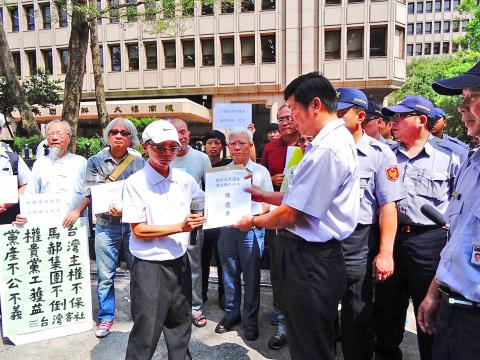|
CEC video ruling spurs protest
ANTIDEMOCRATIC: An alliance of activist groups excoriated a Central Election Commission decision that they say robs voters of their right to free speech
By Alison Hsiao / Staff reporter

A member of the Taiwan Election Supervising Alliance presents a petition to Central Election Commission Deputy Chair Yang Sung-tao in Taipei yesterday.
Photo: Su Fang-ho, Taipei Times
The Taiwan Election Supervising Alliance yesterday decried the Central Election Commission’s (CEC) prohibition against members of the public taking photographs and making video recordings in the audience area at ballot-box tallying stations during vote counting.
The alliance of civil groups called the ban unconstitutional, saying it deprives people of the right to know and the freedom of speech, while panning the restriction as a revival of what they called party-state authoritarian thinking.
“The ban is based on an administrative rule made in 1983, during the Martial Law era. The rule states that people should not be allowed to take pictures or record videos when standing in the audience area during the process of tallying ‘in order to maintain order at the vote-counting station,’” alliance organizer Huang Sheng-feng (黃聖峰) said, calling the CEC’s move anachronistic.
Citizen’s Congress Watch executive director Chang Hung-lin (張宏林) said the nation must upgrade from a “formal democracy to a substantive democracy,” in which active civic supervision is present both before and after an election.
“We have asked the CEC for a stated rule on civic supervision via photography and videotaping, and the reply was that, based on the 1983 administrative rule, citizens could not do so when standing in the audience area. We asked again, saying: ‘What about sitting?’ The response was also negative,” Chang said.
“Next time maybe we should ask them whether we could do so in a kneeling position,” he added.
“The CEC would probably approve of our request if we asked whether we could do so on our knees,” independent Taipei mayoral candidate Neil Peng (馮光遠) said.
“Kneeling is just what the Chinese Nationalist Party (KMT) wants from [us]. There is a reason why [President] Ma Ying-jeou (馬英九) has been dubbed ‘Ma the Emperor,’” he added.
“The KMT is famous for its electoral meddling, whether through pre-election bribery or post-election vote-counting,” Peng said, referring to what is known as the Jhongli Incident (中壢事件) of 1977.
“Enhancing the transparency of the process is the only way [to secure fair elections],” Peng added.
Alliance of Referendum for Taiwan convener Tsay Ting-kuei (蔡丁貴) said that if the CEC could not make the right decision, he would “call on the citizens to occupy the stations and when the citizens outnumber the police, our rights could be secured.”
At a legislative floor meeting, Democratic Progressive Party (DPP) Legislator Su Chen-ching (蘇震清) asked CEC Chairman Liu Yi-chou (劉義周) whether the ban is based on legislation, to which Liu replied that there is currently no law prohibiting the recording of videos or taking of pictures during vote-counting at tallying stations.
“While the Civil Servants Election and Recall Act (公職人員選舉罷免法) stipulates that no one should ‘detect the contents of the ballot marked by any elector via any photography equipment at the polling stations’ and that ‘a polling station shall be immediately transformed into a ballot-counting station after the vote is finished,’ no restriction has been imposed on photography equipment at the ballot-counting station,” Su said.
The CEC and Liu have said, and reiterated yesterday, that the ban aims to prevent those who have bribed voters from “having the chance to verify the outcome of the bribery effort,” since the briber could collude with voters to have the stamp placed on a certain position on a ballot paper.
The controversy of monitoring ballot-box openings first arose when it was found that independent candidates such as Peng and Ko Wen-je (柯文哲) would not be able to recommend polling station supervisors, as the Act states that only those political parties which have received a minimum of 5 percent of all votes in the most recent legislative elections can do so.
source: Taipei Times
|